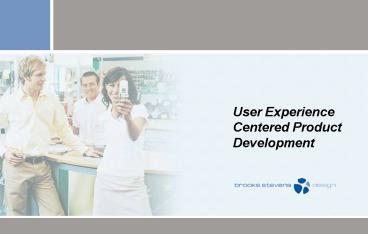User Experience - PowerPoint PPT Presentation
1 / 15
Title: User Experience
1
User Experience Centered Product Development
2
The User Experience What is It?
- Is not a thing or quality of a product It is
a subjective activity. - Encompasses more than merely functionality or
the look and - feel of a product.
- Is influenced by contextual factors, such as
emotional - involvement, social circumstances, and
environmental - conditions.
- Is the total experience and appreciation, in
general or - specifics, a user, has with all aspects of a
product or service - from initial awareness, purchase, initial
use, day-to-day use, - and end of product life.
3
The User Experience Influences
4
Experience Centered Product Design The Approach
Approach that focuses on creating products that
invoke compelling user experiences and return
expected value to the stakeholders by connecting
understanding of user experiences to an
organizations business goals. Systematic design
process that involves multi-disciplinary project
teams with representatives from
- Technology
- Manufacturing
- Project management
- Service and support
- Market and consumer research
- Human factors design
- Industrial design
- Sales marketing
- Internal or external Domain Specialists who
are familiar with - the content matter addressed by the product to
be developed - The User!
5
Why Experience Centered Product Design?
- Businesses that focus on developing products
that aim to be - the least expensive leave themselves
vulnerable to being - quickly beaten on price.
- Businesses that commit themselves to innovative
leadership - and embrace the concepts of user experience
and value will - build customer loyalty, brand awareness and
yield higher - margins.
- Design innovation emerges from a true
understanding of the - fit between a product and a user.
- Experience centered design has an emotional
resonance that - Sticks!
- Design innovation will make the biggest
strategic contribution - to ensure sustainable success and leadership
6
Experience Centered Product Success Apple iPod
- Apple understood the importance of making the
same commitment to the user experience as to the
technological and financial aspects of the
product. - This commitment becomes evident every time you
use the product - Cross-platform compatible
- Plug it in and iTunes launches
- iTunes interface has the same attention to
detail and intuitive - use than the hardware
- Automatically synchronizes downloaded or ripped
music files - Uses Firewire for fast synchronization
7
Experience Centered Product Success Apple iPod
Upon introduction iPod became the leading
digital music player with sales and earnings that
topped all expectations. Apple proliferated the
product line with the iPod mini and iPod Shuffle
and sales continue to soar. In the first three
months of 2005 Apple sold more than five million
digital music players, helping it to boost
quarterly income six-fold.
8
Experience Centered Product Development The
Principles
- 1. Set business goals and objectives
- 2. Develop and understanding of user and
stakeholder needs - Explore initial design concepts around the total
user experience - Evaluate the designs
- Develop design
- Implement final design and launch product
9
Experience Centered Product Development Establish
Business Goals Objectives
- Short and long term business strategy
- Competitive landscape
- Brand identity and vision
- Market statistics and demographics
- Financial and skill based resource
requirements - Patent positions
- Standards and compliance requirements
- Tooling and manufacturing resources and
logistics - Type and format of research activities
- Roles and responsibilities
- Metrics for design evaluation
10
Experience Centered Product Development Understand
User Needs and Desires
- Who will be using the product?
- What is the context of Use?
- What are the functional and practical
requirements? - What is the users emotional involvement prior
experiences? - What are the social and cultural factors
11
Experience Centered Product Development Methods
for Capturing the User Experience
- Contextual Discovery Research
- Contextual inquiries - interviews and
observations in the - natural context of use
- Access information that traditional market
research cannot - - Triggers of use
- - Interaction in the use environment
- - User customization
- - Intangible attributes
- - Unarticulated user needs
12
Experience Centered Product Development Explore
Initial Design Concepts
- Establish prioritized design baseline
- Explore initial design concepts taking into
account - - User needs, desires, total ownership
experience - - Other key stakeholder requirements
- - Cost goals
- - Regulatory requirements
- Include packaging materials and Out-of-Box
experience - Cross-functional collaboration to ensure an
integrated and - coherent design
13
Experience Centered Product Development Evaluate
Design Concepts
- Evaluate the effectiveness of the emerging design
concepts - Validate that the design meets user needs and
expectations - Validate that the design meets other
stakeholder needs - Assess the competitiveness
- Develop prototypes
- Test and obtain feedback frequently
- Cross-functional collaboration to will enhance
testing
14
Experience Centered Product Development Develop
Design
- Transform the most promising conceptual design
into a - concrete and fully detailed design
- Implement final design upgrades and
enhancements - Develop all design end engineering
documentation - Fabricate additional engineering prototypes
for final validation - prior to manufacturing release
- Release design for tooling and production
- Support Vendors in Manufacturing Ramp-Up
- Perform Quality and Compliance Checks
15
Thank You































